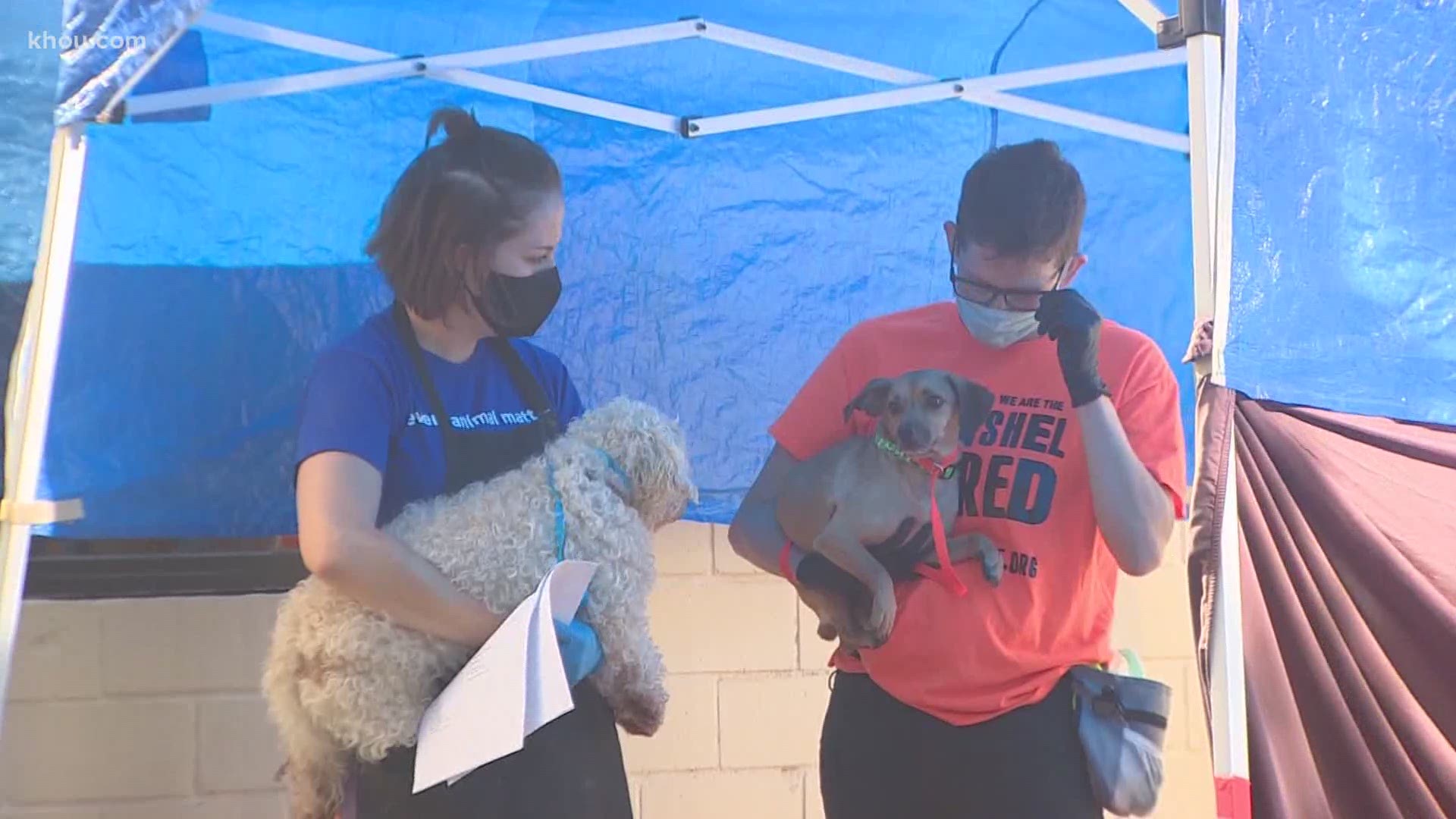HOUSTON — A local animal shelter is standing for Houston and its pets.
To help pet owners during the COVID-19 pandemic, Friends For Life has been vaccinating hundreds of cats and dogs and giving out thousands of pounds of pet food – all for free.
"Unfortunately, during these times, a lot of animals with financial hardships can get surrendered or abandoned and even though that's not the goal people want to do, we obviously have to support ourselves, so what we're trying to do is get ahead," said Dr. Robert Trevino, one of the shelter's volunteer veterinarians.
RELATED: Sick or injured pet? Free mobile veterinary clinic treating Houston pets in need of urgent care
To stay ahead of the curve, the rescue group recently converted their adoption mobile unit into Houston's only free drive-thru clinic for pets.
"This is a totally free service for people. They can sign up and get their pets help. We can get them vaccinated. We can get them treated," said Jennifer Hopkins, communications specialist with Friends For Life.
To maintain social distancing, owners stay in their cars and the volunteers will take your pets and bring them back to you once they're done.
And if you need free pet food, the shelter's got you covered.
Since last month, Friends For Life has distributed 30,000 pounds of pet food and 15,000 vaccinations.
They're also educating families worried about COVID-19 and its impact on our cats and dogs.
"As of right now, there's no information or data that animals or cats can transmit back to people," Dr. Trevino said.
All monumental efforts, with a big payoff.
"It's so fulfilling to know that we're able to touch so many lives and keep families together during this time," Hopkins said.
But as fulfilling as the work may be, Hopkins says it's not always easy.
"Some of these clinic days, I'll be honest, are emotionally draining," Hopkins said.
To lift each other's spirits, some of the volunteers got together on Zoom and posted a funny video showing each other passing their pets to one another.
"It's called pet-pet-pass," Hopkins said.
It proves a little humor, and the willingness to help others, goes a long way.
"I just want the city to know that we're here, and if you need us, we're always here, whether it's COVID-19 or not," Dr. Trevino said.
Friends For Life Animal Shelter's free mobile pet clinic is open every weekend, but you have to sign up before you go. To make an appointment, visit www.friends4life.org.
Coronavirus symptoms
The symptoms of coronavirus can be similar to the flu or a bad cold. Symptoms include a fever, cough and shortness of breath, according to the Centers for Disease Control. Some patients also have nausea, body aches, headaches and stomach issues. Losing your sense of taste and/or smell can also be an early warning sign.
Most healthy people will have mild symptoms. A study of more than 72,000 patients by the Centers for Disease Control in China showed 80 percent of the cases there were mild.
But infections can cause pneumonia, severe acute respiratory syndrome, kidney failure and even death, according to the World Health Organization. Older people with underlying health conditions are most at risk for becoming seriously ill. However, U.S. experts are seeing a significant number of younger people being hospitalized, including some in ICU.
The CDC believes symptoms may appear anywhere from two to 14 days after being exposed.
Human coronaviruses are usually spread through...
- The air by coughing or sneezing
- Close personal contact, such as touching or shaking hands
- Touching an object or surface with the virus on it, then touching your mouth, nose or eyes before washing your hands.
Help stop the spread of coronavirus
- Stay home when you are sick.
- Eat and sleep separately from your family members
- Use different utensils and dishes
- Cover your cough or sneeze with your arm, not your hand.
- If you use a tissue, throw it in the trash.
- Follow social distancing
Lower your risk
- Wash your hands often with soap and water for at least 20 seconds. If soap and water are not available, use an alcohol-based hand sanitizer.
- Avoid touching your eyes, nose, and mouth with unwashed hands.
- Avoid close contact with people who are sick.
- Clean and disinfect frequently touched objects and surfaces.
- If you are 60 or over and have an underlying health condition such as cardiovascular disease, diabetes or respiratory illnesses like asthma or COPD, the World Health Organization advises you to try to avoid crowds or places where you might interact with people who are sick.
Get complete coverage of the coronavirus by texting 'FACTS' to 713-526-1111.

